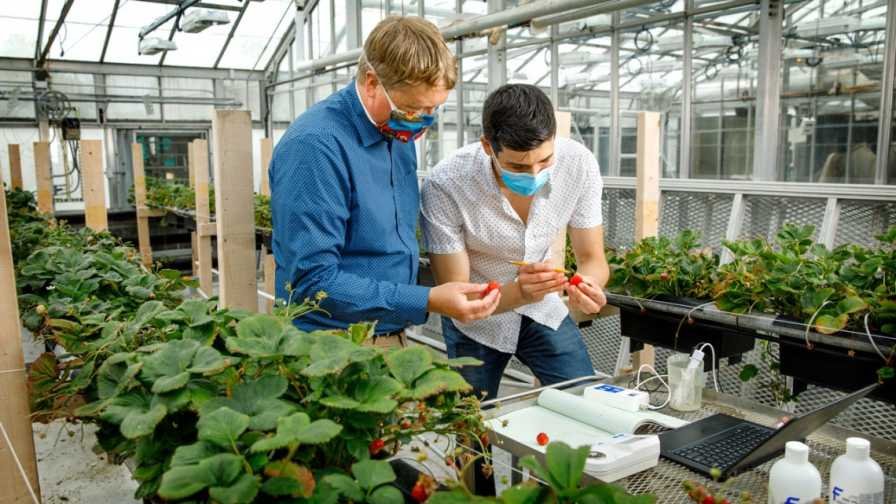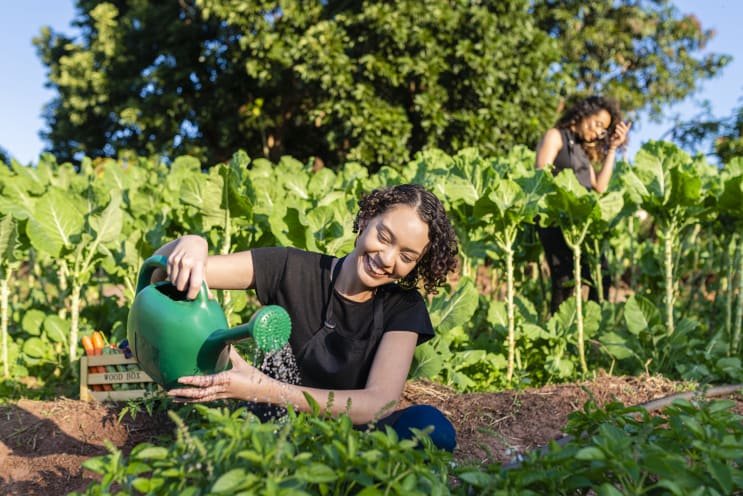Jan 31, 2022
9 Universities Creating The Agricultural Workforce Of Tomorrow

Strawberries growing in the Guterman Bioclimatic Laboratory Greenhouse; Image sourced from Jason Koski/Cornell University
Editor’s Note: This is the second post of a two-part series on careers in the vertical farming industry. The first post featured the Agritecture team’s recommendations for those looking to pursue career pathways in vertical farming. The second post highlights top university degrees and programs teaching urban agriculture or CEA-related skills. Read the first post here.
Beyond gender and racial inequality, a lack of opportunities for migrant workers, and an increasing number of barriers for farmers to set up their businesses, the United States’ agricultural market is facing yet another challenge: aging farmers.
Over one-third of the United States’ 3.4 million farmers are over 65. According to the USDA's latest Census of Agriculture, young farmers aged 35 or younger account for only 9% of this total. With aging farmers, we’re not only losing generational agricultural knowledge, we will also have fewer hands tending farms.
High-tech CEA facilities have become an exciting means to attract younger populations to farming. Lauren Baker, an advisor to Agritecture and the Senior Director of Programs at the Global Alliance for the Future of Food, shares that “if we’re going to have urban farms thriving in our cities, we really need to build an institutional fabric that enables urban agriculture.”
With all this in mind, we are sharing nine universities, broken into three categories, with specific programs geared toward training the agricultural workforce of tomorrow.
3 Universities with CEA-Focused Degrees and Programs

This university hosts one of the only Controlled Environment Agriculture Center’s (CEAC) globally. Students have access to undergraduate and graduate programs in Biosystems Engineering, Sustainable Plant Systems, AgTech Management, and Applied Biosciences. Arizona’s climate provides students with the perfect opportunity to cultivate technologies that can efficiently produce crops in growing systems designed for arid lands and urban settings.
Agritecture’s Agriculture Technologist, Justin Hyunjae Chung, graduated with an MSc in Biosystems Engineering from the University of Arizona, where he worked at CEAC, specializing in specialty mushroom cultivation. He shares that “attending the University of Arizona was the best decision I made to enter the booming CEA industry: the coursework helped me gain a solid foundation for learning about more advanced CEA concepts, and learning with like-minded students made for a wonderful learning environment.” Contact Justin to learn more about his experience.

With on-site greenhouse and hydroponic facilities, Purdue’s Controlled Environment Agriculture (NEMALI Lab) hosts lectures and workshops with hands-on activities for students to learn about optimal conditions for growing hydroponic lettuce, including nutrient recipes, production systems, artificial lighting practices, and optimal temperatures for lettuce.

With a focus area in CEA, Cornell’s specialized, one-year, course-based Master of Professional Studies (MPS) in Integrative Plant Science trains greenhouse growers, research specialists, pest management professionals, facilities managers, lighting systems specialists, hydroponics specialists, and more. This education can be supported with other focus areas across the College of Agriculture and Life Sciences, like Plant Breeding, Soil Science, Plant Biology, Environmental Science and Climate Change, Food Systems and Garden-Based Education.
Agritecture’s Food Systems Consultant, Christian Kanlian, received his B.S. from the School of Integrative Plant Sciences at Cornell University. He shares that “being able to interact with world experts from the breadth of fields that Cornell offers was one of the most impactful aspects of my time there. Cornell also provided great experiential learning and leadership opportunities that I was able to take advantage of, like working on the Student Farm and participating in a Cooperative Extension Internship.” Contact Christian to learn more about his experience.
3 Universities with Urban Agriculture-Focused Degrees and Programs

Established in 1994, Ryerson University’s Centre for Studies in Food Security (CSFS) offers two certificate programs in urban agriculture and food security. These programs combine practical hands-on learning at Ryerson’s Farm that springboard into practical skills, with independent study and knowledge about the policy, planning, public health, and economic development implications of urban farms.
Agritecture’s Founder & CEO, Henry Gordon-Smith, earned his Certificate in Food Security and Urban Agriculture from Ryerson before starting this company. He shares that “the certificate program made a huge impact on my professional career. The program is global and focuses on what food security is and the key local drivers for various methods. This framed my thinking strategically and gave me an abundance of case studies I can pull from.” Contact Henry to learn more about his experience.

Alongside offering more field agriculture-based Associate Diploma Programs & Undergraduate Degrees, the University of Guelph’s Ontario Agricultural College also offers Certificates for Continuing Education in Urban Sustainable Agriculture & Horticulture. This university is internationally renowned for its research, teaching, and knowledge extension, and can provide you with the foundational agricultural knowledge you need to get started.

This school in Singapore offers a Diploma in Applied Science (Urban Agricultural Technology) to enable students to take on roles ranging from agrotechnologists to produce and marketing specialists. Participants learn more about food production technologies, farming processes and management, urban farming technology and systems, agribusiness, and sustainable farming.
3 Universities with Other Relevant Agricultural Technology-Focused Degrees and Programs

This well-known public university in the Netherlands specializes in technical and engineering subjects related to agricultural research. With numerous Master’s programs in Agroecology, Aquaculture, Biosystems Engineering, Biotechnology, Food Safety & Quality Management, Food Technology, and more, Wageningen prepares students for career pathways in various AgTech fields.
Agritecture’s Systems Engineer, Alberto López, graduated from Wageningen with an MSc in Biosystems Engineering, and a specialization in Farm Technology. He shares “with more than 100 different countries represented and very diverse backgrounds, studying at Wageningen allowed me to understand how agricultural problems are solved around the world and provided me the tools to implement those solutions in unique contexts.” Contact Alberto to learn more about his experience.

UC Davis’ College of Agricultural and Environmental Sciences manages 162 greenhouses and related facilities, offering a total of 155,000 sq. ft. for research and teaching on the campus. Amongst these is a 320-square-foot on-campus greenhouse, complete with hydroponic growing systems and rows of vertically hung panels that can be filled with herbs and leafy greens.

The prestigious College of Agricultural & Life Sciences offers a host of degrees in agricultural sciences, natural resources, and forest and geospatial sciences. Agritecture recently interviewed the University of Florida’s Institute of Food and Agricultural Sciences (UF/IFAS) Mid-Florida Research & Education Center (MREC) team on land-grant institutions & the Cooperative Extension System (CES).
Read the exclusive interview.
There are numerous universities out there spreading agricultural knowledge and training the farmers of tomorrow. Amongst those not mentioned in this list are Ohio State University, Michigan State University, and the University of Arkansas’ Dale Bumpers College of Agricultural, Food and Life Sciences.


